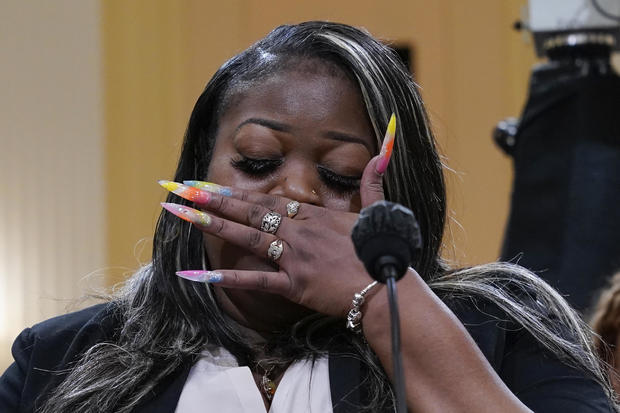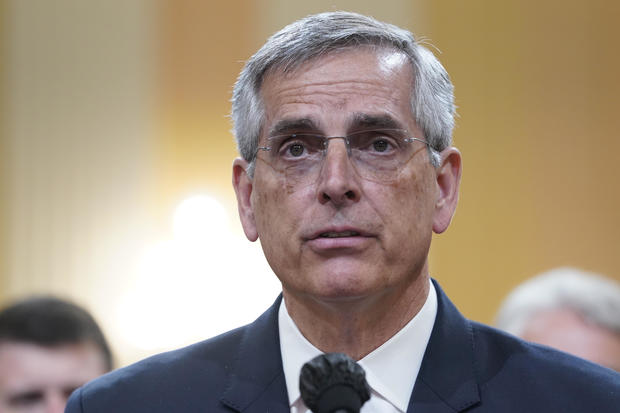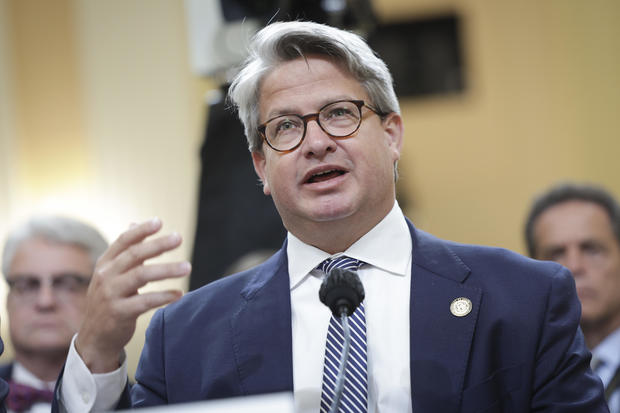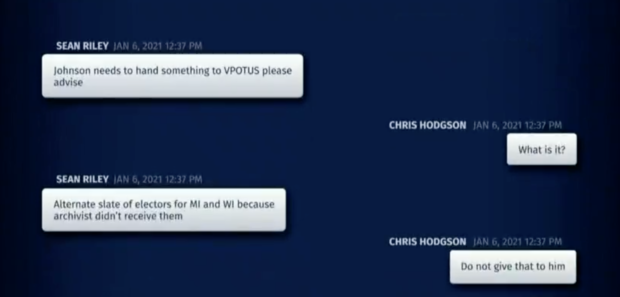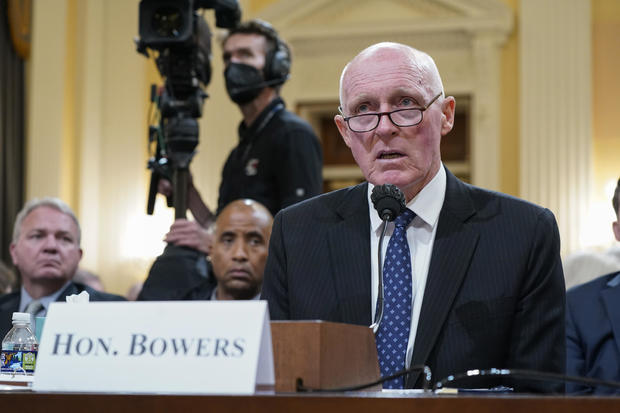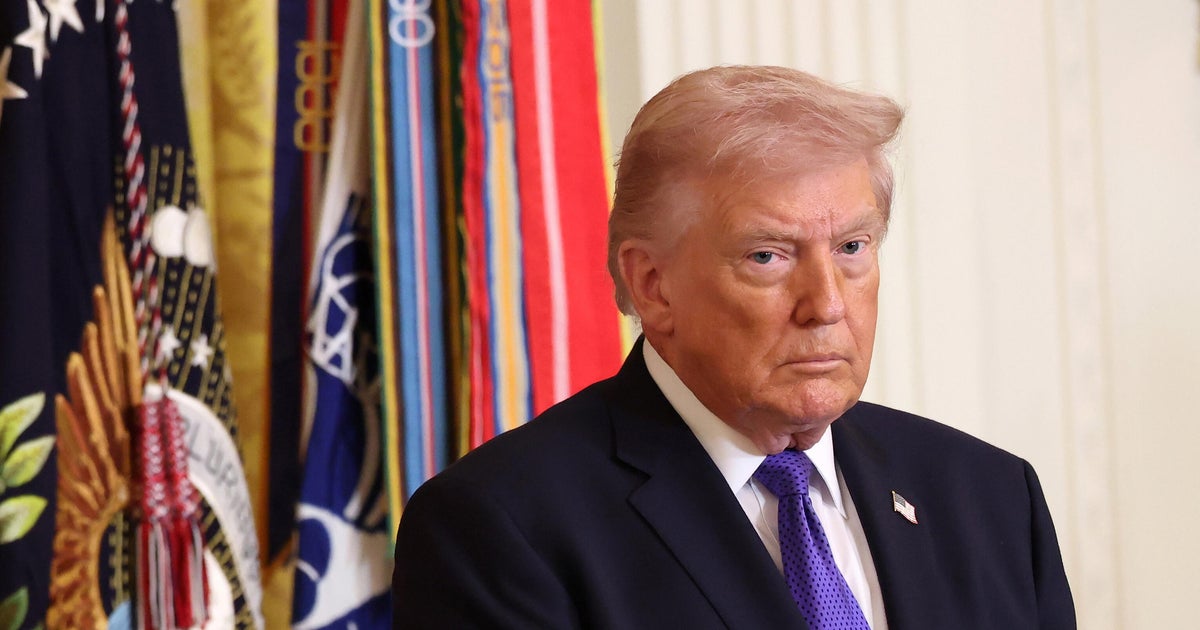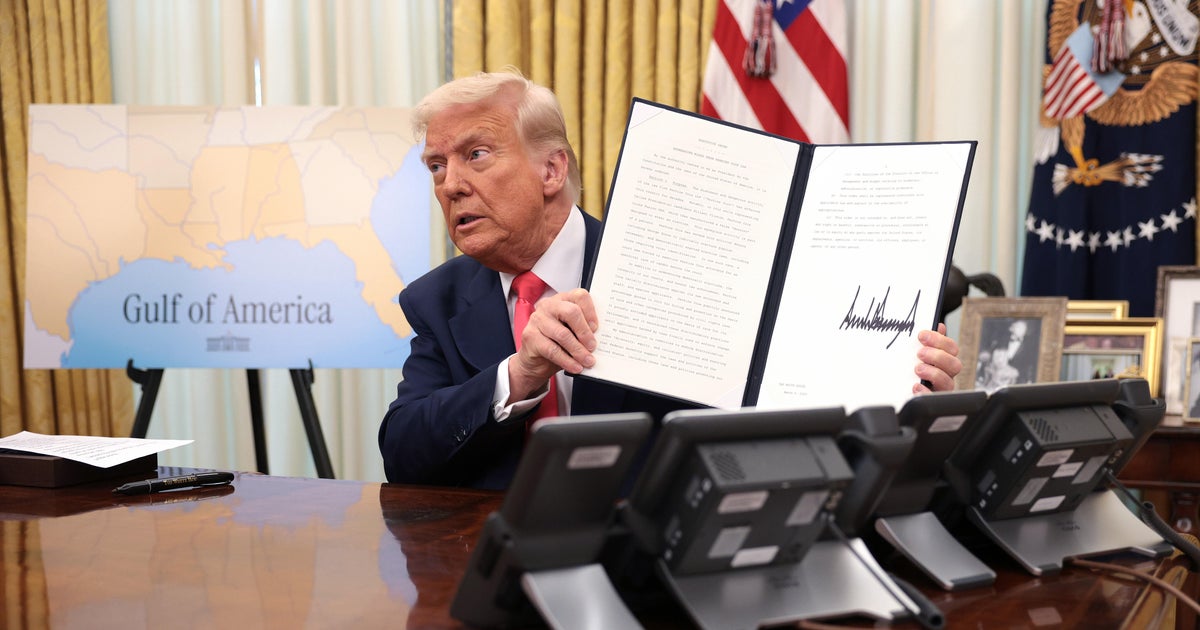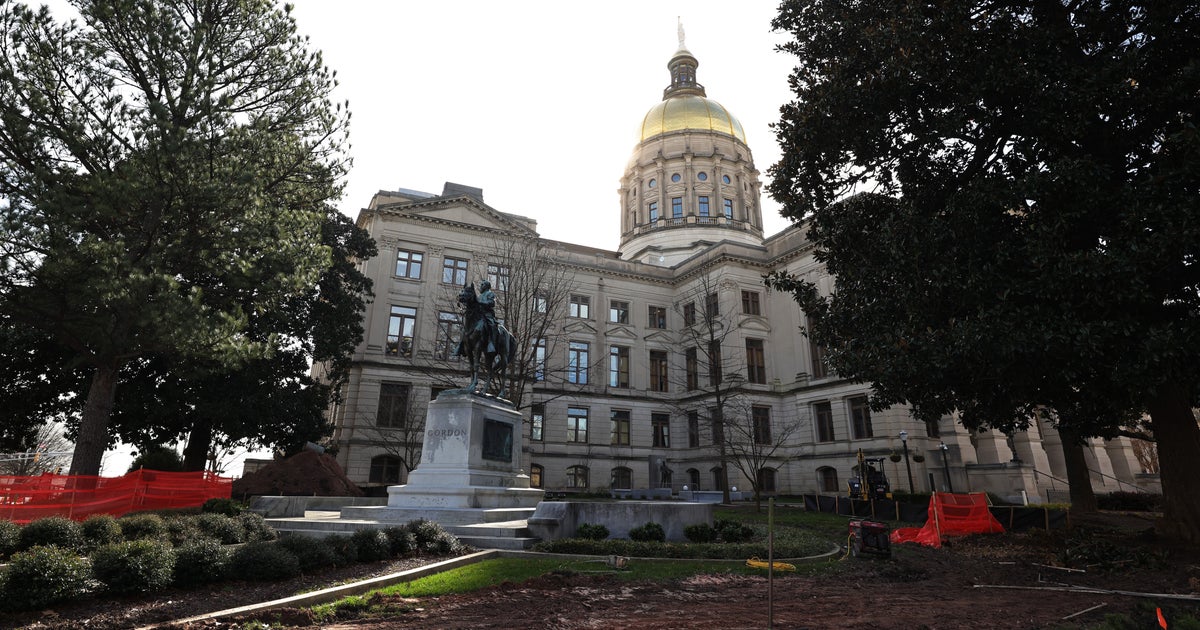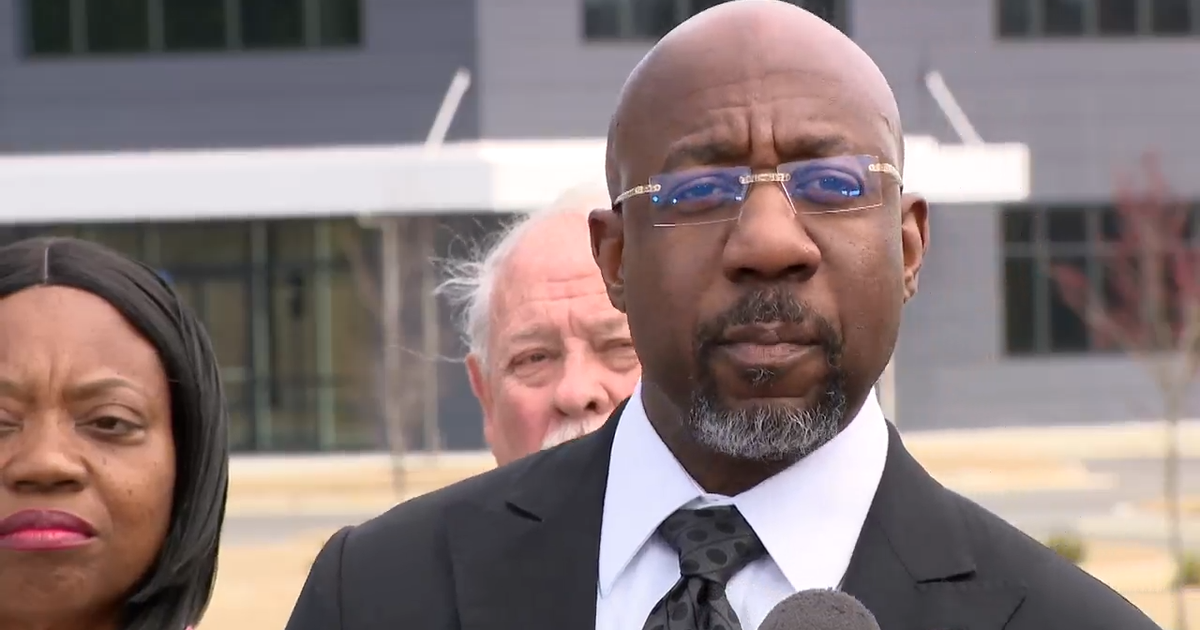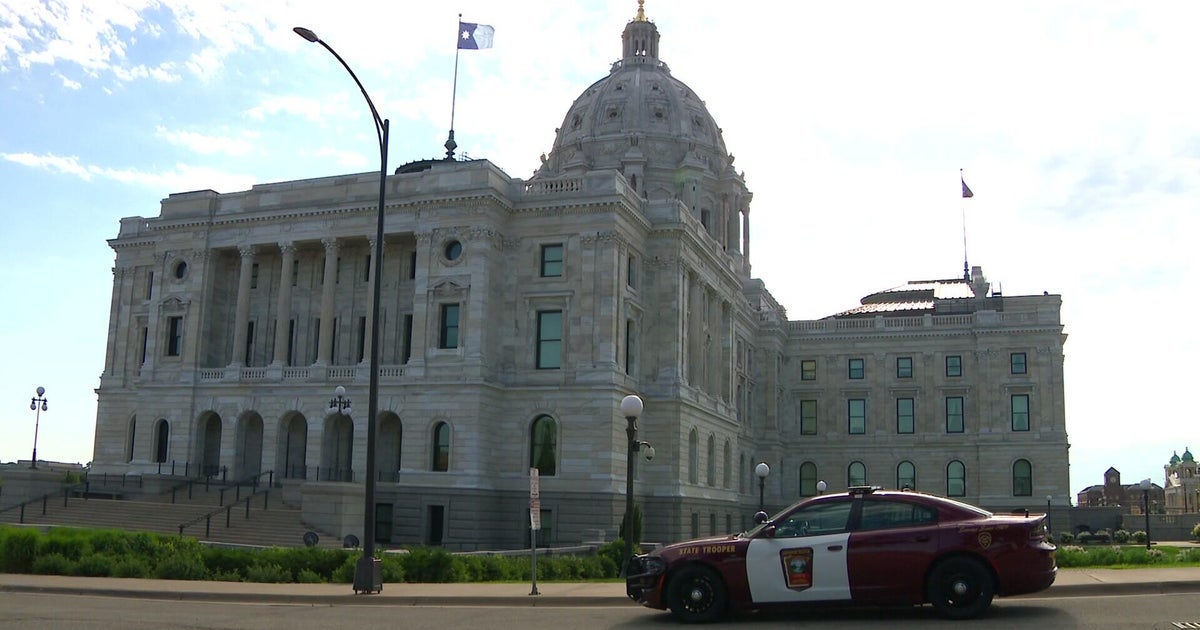House Jan. 6 committee focuses on "fake electors" and threats to public servants amid Trump pressure campaign
The House select committee investigating the Jan. 6, 2021, attack on the U.S. Capitol in Tuesday's hearing detailed the threats made to state lawmakers and election officials and workers in Arizona and Georgia, as President Donald Trump and his allies tried to get them to overturn the election results in their states.
The committee sought on Tuesday to bring to light the severity of the threat to democracy in the days and weeks after the election, given the enormous and persistent pressure by the president and by Rudy Giuliani on officials and ordinary Americans to promote the "big lie" that Trump had won the election. The ability of these Americans to withstand that pressure came at a great personal cost.
"Our democracy held because courageous people like you heard today put their oath to the constitution above their loyalty to one man," Committee member Rep. Adam Schiff said.
"The system held but barely and the question remains, will it hold again?"
The hearing laid out the plan hatched by Trump and his allies in Arizona to replace the bona fide Biden electors with phony ones. The fake electors gathered in Arizona, which Arizona House Speaker Rusty Bowers referred to as a "tragic parody." Bowers refused to have any involvement in the fake electors plan being pushed by Giuliani.
Texts showed by Schiff revealed that Republican Sen. Ron Johnson of Wisconsin could also have played a part in the false electors scheme. The texts, between Johnson's chief of staff and an aide to Pence, showed Johnson's aide informing Pence's aide that the senator was ready to deliver fraudulent ballots to Pence. "Do not give that to him," Pence's aide responded.
Bowers said a "tenet of my faith is that the Constitution is divinely inspired," and that what he was being asked to do was "foreign to my very being."
The Arizona House speaker also described what his personal life has been like since the election. In emotional testimony, Bowers said that until "very recently," his family had begun to dread Saturdays, when Trump supporters would drive around his neighborhood and falsely announce that he was a "pedophile" and a corrupt politician. He recounted an argument between a neighbor and a man with a pistol, and also talked about the reactions of his family.
"At the same time, on some of these, we had a daughter who was gravely ill who was upset by what was happening outside and my wife, that is a valiant person, very strong, quiet, very strong woman," he said, growing emotional. "So it was disturbing." Bowers did not mention that in early 2021, his daughter died after her illness.
Fulton County election worker Wandrea Arshaye ("Shaye") Moss, who was falsely accused, along with her mother, of carrying out a fake ballot scheme and called them professional vote scammers, allegations that led to death threats and intimidation, and forced them into hiding, committee aides said. The committee showed video of Moss' mother, Ruby Freeman, testifying that she had "lost my name" after all the threats.
Moss said that her life had been upended since the election.
"I haven't been anywhere at all – I gained about 60 pounds, I don't do nothing anymore, I second-guess everything I do," Moss said. "It's affected my life in a major way, in every way. All because of lies for me doing my job, same thing I've been doing forever."
Moss said that she and none of her colleagues at Fulton County still work there.
Committee vice chair Rep. Liz Cheney said that Trump "did not care about these threats of violence" and said, "we cannot let America become a nation of conspiracy theories and thug violence."
Committee chair Rep. Bennie Thompson said in his opening statement that "pressuring public servants to betray their oaths was a fundamental part" of Trump's "playbook."
Thompson said Trump's pressuring of these election officials was based on the "big lie." "The lie hasn't gone away. It's corrupting our democratic institutions," Thompson added, specifically noting that a New Mexico county official refused to certify the recent primary results.
The committee also heard testimony from two Republicans in Georgia, Secretary of State Brad Raffensperger and Gabriel Sterling, chief operating officer for the secretary of state's office. Raffensperger and Sterling detailed how they were pressured by Trump to find more votes in their states.
"I think sometimes moments require you to stand up and just take the shots — you're doing your job," Raffensperger said. "And that's all we did. We just followed the law & followed the constitution. At the end of the day, President Trump came up short."
The committee will hold the next public hearing on Thursday at 3 p.m.
Did Ron Johnson contact Pence about electors? Johnson tells CBS News "the answer is NO"
Republican Sen. Ron Johnson of Wisconsin told CBS News' Robert Costa in a text that "the answer is NO" when asked if he ever contacted former Vice President Pence personally about electors. "This is a complete NON story," he added.
The committee showed texts between his chief of staff Sean Riley and a Pence aide.
"Johnson needs to hand something to VPOTUS please advise," Riley texted.
"What is it?" Pence aide Chris Hodgson responded.
"Alternate slate of electors from MI and WI because archivist didn't receive them," Johnson aide Riley said.
The texts were confirmed by a Pence aide to CBS News.
Cheney calls Tuesday's testimony "particularly compelling"
Cheney told reporters that the committee is "putting forth very clearly a number of instances in which there are serious questions about the actions of the former president."
Cheney described Tuesday's testimony as "particularly compelling" because it included Republicans and Democrats who did what they thought was right despite pressure from Trump.
Former Watergate prosecutor believes former President Trump will be indicted in Georgia
Fourth hearing closes out
After more than two-and-a-half hours of testimony, the fourth hearing closed. The next hearing will be Thursday, when witnesses will discuss Trump's attempts to influence the Justice Department to support his attempts to overturn the election, Thompson said.
Cheney said the committee on Tuesday was reminded that the United States is a "nation of laws," and institutions don't defend themselves.
"Individuals do that," she said.
"We also had been reminded what it means to take an oath under God to the Constitution," Cheney added.
To date, Cheney said more than 30 witnesses have not come before the committee and have invoked their Fifth Amendment rights against self-incrimination, specifically calling out Trump chief of staff Mark Meadows.
"Mark Meadows has hidden behind President Trump's claims of executive privilege and immunity from subpoenas," Cheney said. "We are engaged now in litigation with Mr. Meadows."
Cheney also said the American people have the right to hear from former White House counsel Pat Cipollone personally.
Thompson thanked the witnesses who testified, and made personal sacrifices for the country.
"We've heard the stories of their courage," Thompson said. "They've earned the thanks of a grateful nation."
Former election worker Shaye Moss tells committee of threats against her "all because of lies"
With her mother, Ruby Freeman, a fellow election worker for the 2020 election, sitting by her, Wandrea "Shaye" Moss detailed the threats she received in the wake of Election Day on Nov. 3, 2020, which were spurred by false allegations prompted by Trump and Giuliani.
Giuliani and Trump baselessly claimed she and her mother were involved in a plot to bring "suitcases" of ballots for Biden into the State Farm Arena and scan them multiple times. Giuliani also falsely told the state senate in a hearing that Freeman, Moss and another man were "passing around USB ports as if they are vials of heroin or cocaine."
Moss said she learned of the allegations raised against her while at work for Fulton County, where she was shown a video clip of her from the State Farm Arena that claimed she was engaged in wrongful conduct.
Moss's supervisors told her that Trump and his supporters were dissatisfied with the results of the election, which led to threats against not only them, but also Moss and her mother.
"Wishing death upon me, telling me that I'll be in jail with my mother and saying things like, 'Be glad it's 2020 and not 1920,'" she recalled.
Moss said many of the comments were racist and hateful.
Rather than passing around flash drives, as Giuliani falsely claimed, Moss said her mother was handing her a ginger mint.
Trump also repeatedly attacked Moss in his call with Raffensperger, which she said left her feeling "horrible."
"I felt like it was all my fault. If I would have never decided to be an elections worker — I could have done anything else. That's what I decided to do, and now people are lying and spreading rumors and lies and attacking my mom. I'm her only child. Going to my grandmother's house. I'm her only grandchild. And my kid is just, I felt so bad," she said. "I felt bad for my mom, and I felt horrible for picking this job and being the one that always wants to help and always there. Never miss not one election. I just felt like it was my fault for putting my family in this situation."
Freeman, Moss's mother who was a Fulton County election worker, also spoke with the committee behind closed doors, during which she said she refuses to introduce herself by her name in public for fear of who's listening.
"I've lost my name and I've lost my reputation. I've lost my sense of security, all because a group of people starting with number 45 and his ally Rudy Giuliani decided to scapegoat me and my daughter, Shaye, to push their own lies about how the presidential election was stolen," Freeman said.
Moss told the committee the unfounded allegations promoted by Trump turned her life "upside."
"I no longer give out my business card. I don't transfer calls. I don't want anyone knowing my name," she said, adding she has gained weight and has not gone out in public. "It's affected my life in a major way. In every way. All because of lies, for me doing my job."
Freeman also told the committee that the week of Jan. 6, the FBI informed her she had to leave her home for her safety, which she did for roughly two months.
"I can't believe this person has caused this much damage to me and my family," she told staff with the panel.
Moss then said protesters also went to her grandmother's house and said they were there to "make a citizen's arrest" and had to find Moss and Freeman.
"She went through a lot that she didn't have to and once again it made me feel just so horrible," Moss said.
Of the election workers and supervisors shown in video from the State Farm Arena, Moss said none of them continued in their jobs. Moss also left.
"There is nowhere I feel safe. Nowhere. Do you know how it feels to have the president of the United States target you? The president of the United States is supposed to represent every American, not to target one," Freeman said. "But he targeted me, Lady Ruby, a small business owner, a mother, a proud American citizen who stood up to help Fulton County run an election in the middle of the pandemic."
Raffensperger says his wife received "sexualized" texts harassing her because he wouldn't defy the Constitution
Raffensperger described the harrowing experiences his family members went through as a result of his defense of the Constitution and refusal to throw the election for Trump.
"After the election, my email, my cell phone was doxxed, and so I was getting texts all over the country. And then eventually my wife started getting texts, and hers typically came in as sexualized texts, which were disgusting," Raffensperger testified. "You have to understand that Trish and I, we met in high school, we've been married over 40 years now. And so they started going after her I think just to probably put pressure on me, 'why don't you just quit, walk away.' And so that happened. And then some people broke into my daughter-in-law's home. And my son has passed and she's a widow, and has two kids. And so we're very concerned about her safety also."
Schiff asked Raffensperger why he didn't just quit, when even the safety of his family felt at risk.
"Because I knew that we had followed the law, we had followed the Constitution," Raffensperger said. "And I think sometimes moments require you to stand up and just take the shots doing your job. That's all we did. We just followed the law and we followed the Constitution. And at the end of the day, President Trump came up short."
Trump told chief investigator for Georgia secretary of state she'll be "praised" for "right answer"
Even as top officials within the Justice Department told that Trump allegations about voter fraud in Fulton County were investigated and found to be without merit, the former president pressed on with his claims and efforts to pressure elections officials in the state.
The White House, including Meadows, called and texted Raffensperger's office 18 times to set up a call. Meadows also appeared at a signature audit site in Georgia, where he met with Frances Watson, the chief investigator of the investigations division for the secretary of state who was supervising the audit, Schiff said.
Meadows also set up a call between Trump and Watson, during which he continued to claim he won Georgia, the committee revealed.
"It's just you have the most important job in the country right now, because if we win Georgia, first of all, if we win, you're gonna have two wins. They're not gonna win right now, you know," he said, according to a recording of the call obtained and played by the committee. "They're down because the people of Georgia are so angry at what happened to me. They know I won. Won by hundreds of thousands of votes, it wasn't close."
Trump also told Watson, "when the right answer comes out you'll be praised. I mean, I don't know why, you know, they've made it so hard. They will be praised."
"Simply put, in a nutshell, what happened in the fall of 2020 is that 28,000 Georgians skipped the presidential race and yet they voted down ballot in other races. And yet the Republican congressmen ended up getting 33,000 more votes than President Trump, and that's why President Trump came up short," Raffensperger said, refuting Trump's claim he handedly won the state.
Also in his call with Watson, Trump told her, "Whatever you can do, Frances. It would be, it's a great thing. It's an important thing for the country."
Text messages obtained by the committee indicated Meadows wanted to send Watson's investigators "a s**t load of POTUS stuff," according to a White House aide, such as coins and autographed MAGA hats, though White House staff intervened, Schiff said.
Trump also underscored to Watson the importance of Jan. 6, telling her, "Do you think they'll be working after Christmas, to keep it going fast? Because, you know, we have that date of the 6th, which is a very important date," according to a clip of the call played by the committee.
A week after speaking with Watson, Trump called Raffensperger to raise false claims about Georgia's election results. The call lasted 67 minutes in all, Schiff said.
The committee aired portions of the discussion, during which Trump raised the alleged suitcases of ballots for Mr. Biden, which had been investigated and batted down by the Justice Department, Georgia Bureau of Investigations and Georgia secretary of state's office.
"They're standard ballot carriers that allow seals to be put on them so that they're tamper-proof," Sterling said of what Trump was seeing.
Trump also spoke with Raffensperger about allegations that votes were "dropped" late at night, which the secretary of state said likely referred to the uploading by counties of election results.
Raffensperger says 4 dead people voted in Georgia, not thousands
The committee continued to play a phone call Trump had with Raffensperger after the election in which Trump baselessly claimed thousands of dead people voted in Georgia.
"The other thing, dead people," Trump said in the call. "So dead people voted. And I think the number is close to 5,000 people. And they went to obituraries, they went to all sorts of methods to come up with an accurate number. And a minimum is close to about 5,000 voters."
Asked about claims of thousands of dead people voting, Raffensperger testified his office found those claims inaccurate.
"No, it's not accurate," Raffensperger responded. "Actually, in their lawsuits, they allege 10,315 dead people. We found two dead people when I wrote my letter to Congress that's dated Jan. 6, and subsequent to that, we found two more. That's one, two, three, four people, not 4,000, but just a total of four. Not 10,000, not 5,000."
Sterling says trying to fight Trump misinformation was "like a shovel trying to empty the ocean"
Schiff asked Sterling what it was like to compete with a president who had the "biggest bully pulpit in the world to push out these false claims" of widespread election fraud.
"For lack of a better word, it was frustrating," Sterling responded. "But oftentimes, I felt our information was getting out, but that there was a reticence of people who needed to believe it to believe it because the president of the United States, who many looked up to and respected, was telling them it wasn't true, despite the facts."
"And I have characterized at one point, it was kind of like a shovel trying to empty the ocean," Sterling continued. "And yes, it was frustrating. I even have family members who I had to argue with about some of these things. And I would show them things. And the problem you have is, you're getting to people's hearts."
Sterling recalled trying to present facts about the integrity of the election to an attorney he knows.
"But at the end he goes, 'I just know in my heart they cheated,'" Sterling recalled. "Once you get past the heart, the facts don't matter as much."
Still, Sterling said his office's job was to do the work, and make sure the institutions held.
"And the institutions held," he said.
Sterling debunks Trump and Giuliani's false claims election workers had "suitcases" of ballots for Biden
As the committee shifted its focus to the election results in Georgia, Raffensperger reiterated that Mr. Biden defeated Trump in the state by a margin of approximately 12,000 votes.
The 5 million votes cast in Georgia were counted three times: through a machine recount, forensic audit and hand recount, each of which confirmed that "President Trump did some up short," Raffenspeger said.
The committee also played video from a press conference Sterling gave Dec. 1, 2021, in which he appealed directly to the president and told him to stop inspiring people to commit acts of violence.
Sterling said the spark for his comments was a call he received from a "shaken" project manager from Dominion Voting Systems, who relayed that a young contractor had been receiving threats.
After scrolling through Twitter, Sterling said he saw a tweet that was the "straw that broke the camel's back," as it named the contractor, accused him of committing treason and said "may God have mercy on your soul." The tweet included a GIF with a noose.
"For lack of a better word, I lost it. I just got irate," Sterling said of his reaction to the Twitter threat. "I lost my temper but it seemed necessary at the time."
Despite the heated environment in Georgia and Sterling's appeal to the then-president, Trump and Giuliani continued to push claims of fraud in Fulton County, which includes Atlanta, falsely alleging there were suitcases full of ballots for Mr. Biden.
Sterling said investigators reviewed 48 hours of footage from the vote-counting center in the State Farm Arena in Atlanta, which showed "Fulton County election workers engaging in normal ballot processing."
"One of the things that was very frustrating was the so-called suitcases of ballots from under the table," he said. The entirety of the video, he said, shows election workers gathering their belongings to leave for the night and putting ballots ready to be scanned into sealed, tamper-proof ballot carriers, which were then placed under the table.
All clear given after Capitol police investigate suspicious package at House office building out of "due diligence"
U.S. Capitol Police said they were doing their "due diligence" and investigated a suspicious package at the entrance of one of the House office buildings.
Staff and personnel were told to avoid the area.
The all clear was given by 3 p.m.
Bowers says fake electors scheme was a "tragic parody," details threats at his house
Asked what he thought when he learned fake electors for Trump met in Phoenix and sent their votes to Washington, Bowers said, "This is a tragic parody."
The Arizona Republican also detailed the barrage of threats he received after defying Trump and refusing to go along with the plan from the former president and Eastman to replace Arizona's electors with a pro-Trump slate.
His office received "in excess" of 20,000 emails and "tens of thousands" of voicemails and text messages, Bowers said.
"We were unable to work, at least communicate," he told the committee.
Bowers said protesters also descended upon his home, creating a "new pattern in our lives to worry about what will happen on Saturdays," as groups appeared outside his house and played video claiming he is a pedophille and corrupt politician.
Protesters have also left literature on his property and argued with and threatened not only Bowers, but also his neighbors.
Bowers recalled seeing one man who wore three bars on his chest and was carrying a pistol.
"At the same time, on some of these, we had a daughter who was gravely ill who was upset by what was happening outside and my wife, that is a valiant person, very strong, quiet, very strong woman," he said, growing emotional. "So it was disturbing."
Bowers daughter died in January 2021.
Ron Johnson wanted to hand deliver fake electors to Pence, texts show
GOP Senator Ron Johnson of Wisconsin wanted to hand deliver alternate, fraudulent electors to Vice President Mike Pence ahead of the joint session of Congress, according to texts the committee provided.
Text message records show top Johnson aide Sean Riley asking top Pence aide Chris Hodgson about the matter early in the afternoon of Jan. 6, 2021.
"Johnson needs to hand something to VPOTUS please advise," Riley texted.
"What is it?" Pence aide Hodgson responded.
"Alternate slate of electors from MI and WI because archivist didn't receive them," Johnson aide Riley said.
"Do not give that to him," Pence's aide responded.
Committee shares evidence of fake elector scheme
The committee laid out evidence of Trump's fake elector scheme, showing documents and interviews from Trump allies detailing the scheme.
"Under our Constitution, when we cast our votes for president, we are actually voting to send electors pledged to our preferred candidate to the Electoral College. In December, the electors in each state meet, cast their votes and send their votes to Washington. There is only one legitimate slate of electors from each state. On the sixth day of January, Congress meets in a joint session to count the votes and the winner of the Electoral College vote becomes the president," Schiff said.
Then, Schiff played a montage of depositions that he said showed "how President Trump and his campaign were directly involved in advancing and coordinating the plot to replace legitimate Biden electors with fake electors not chosen by the voters."
"You will hear how this campaign convinced these fake electors to cast and submit their votes through fake certificates, telling them that their votes would only be used in the event that President Trump won his legal challenges. Yet when the president lost those legal challenges, when courts rejected them as frivolous, without merit, the fake elector scheme continued," Schiff said.
Schiff noted that several of Trump's campaign lawyers "walked away rather than participate in the plan."
"His own White House Counsel's Office said that the plan was not legally sound," he said.
In the video, Casey Lucier, investigative counsel for the committee, said Trump lawyer Kenneth Chesebro, wrote a memo on Nov. 18, 2020, saying the Trump campaign should organize its own electors in swing states that Trump lost.
"The select committee received testimony that those close to President Trump began planning to organize fake electors for Trump in states that Biden won in the weeks after the election," Lucier said.
Cassidy Hutchinson, a former aide to Mark Meadows, said Rudy Giuliani, Giuliani associates, Meadows and members of Congress were involved in such discussions around Thanksgiving.
Ronna Romney McDaniel, RNC chairwoman, said in her deposition that the campaign asked the RNC to help gather "contingent electors" in case the legal challenges succeeded.
Instructions were given to the electors in several states that they need to cast ballots in secrecy, committee investigators said, and fake electors met on Dec. 14 in Arizona, Georgia, Michigan, Pennsylvania, New Mexico, Nevada and Wisconsin, signing documents claiming they were duly elected electors from their state.
Arizona House speaker recalls push from Trump attorney John Eastman and GOP Rep. Andy Biggs to decertify electors
After the election, Bowers also recalled how Trump attorney John Eastman and Republican Rep. Andy Biggs urged him to decertify electors for Mr. Biden in Arizona.
Bowers testified that Eastman in a phone call urged him to call Arizona lawmakers back into session to decertify Arizona's electors for Biden. Bowers pushed back, but Eastman persisted.
"Just do it, and let the courts sort it out," Bowers recalled Eastman saying.
Bowers also testified he received a call from Biggs, asking if he would sign onto a letter and support the de-certification of the electors.
"And I said I would not," Bowers testified.
Biggs has refused to cooperate with the select committee.
Arizona House speaker says he "did not want to be used as a pawn" in scheme to subvert election
Arizona House Speaker Rusty Bowers, a Republican, testified to the committee that "yes," he wanted Trump to win a second term, but "yes," President Biden won in Arizona.
Bowers said it is "false" that he ever told the former president he won Arizona, even though Trump claimed that was the case.
Bowers described a call he received from Trump and former Trump attorney Rudy Giuliani on a Sunday after the 2020 presidential election.
Bowers testified that he asked Guiliani for evidence of the fraud Giuliani claimed on "multiple occasions," such as Giuliani's claim that thousands of illegal immigrants and dead people voted.
Bowers said Guiliani told the then-president and Bowers that he would follow through with that evidence. But Bowers said he "never" received such evidence.
Bowers said he was first asked to allow an official committee at the Arizona Capitol so they could hear evidence of alleged election fraud and then take action.
"And I refused," Bowers said, noting a "circus" of demonstrations had been brewing, and he didn't want that in the Arizona House.
"I did not feel that the evidence, granted in its absence, merited the hearing, and I did not want to be used as a pawn," he said.
Bowers said he was told there was a legal theory in Arizona that Biden electors could be replaced with Trump electors.
"I said that's — that's totally new to me. I've never heard of any such thing," Bowers said, adding that such a thing would be "counter" to his "oath," and to his faith.
Bowers said a "tenet of my faith is that the Constitution is divinely inspired," and that what he was being asked to do was "foreign to my very being."
Bowers said "no one" ever provided him evidence of voter fraud in Arizona sufficient to overturn the election.
Bowers said the president called him another time, in December, and told him that while he had wanted him to win, he did not win the election and Bowers would not do anything in an attempt to change that.
Trump supporters join pressure campaign against Republican leaders in Michigan, Pennsylvania, committee shows
Not only did the president attempt to enlist state election officials and lawmakers in his quest to stop the transfer of power, but he also encouraged his supporters to ramp up the pressure for state legislatures to appoint an alternate slate of electors, according to the select committee.
"The president's supporters heard the former president's claims of fraud and the false allegations he made against state and local officials as a call to action," Schiff said.
The committee played video of protesters outside the home of Jocelyn Benson, the Michigan secretary of state, who said the uncertainty of what the demonstrators would do drove her fear.
"Are they coming with guns? Are they going to attack my house? I'm in here with my kid," she said, according to a recording of her interview that played during the hearing.
The president and his lawyers mounted pressure on election officials spanning several states, according to a video crafted by the panel that featured Josh Roselman, investigative counsel for the select committee.
Giuliani and Jenna Ellis, another lawyer working with the Trump campaign, appeared before state lawmakers pushing their claims of fraud, and the former president's re-election campaign distributed a script to supporters, in which they told state lawmakers they had "the power to reclaim your authority to send a slate of electors that will support President Trump and Vice President Pence," according to a recording obtained by the panel.
Trump himself also invited delegations from Michigan and Pennsylvania to the White House, and at least one Republican, Michigan state Senate Majority Leader Mike Shirkey, told the panel he reiterated to the president they would follow the law.
Trump even posted Shirkey's contact information online, and the Michigan Republican said he received thousands of text messages encouraging him to take action.
"They were believing things that were untrue," Shirkey told the committee of the Trump supporters claiming the state legislature could appoint a dueling slate of electors.
Bryan Cutler, speaker of the Pennsylvania House, received numerous calls from Giuliani and Ellis, and in one voicemail obtained and played by the committee, Giuliani teases he has "something important to call to your attention that I think really changes things."
Cutler, according to Roselman, felt the calls were inappropriate and had his lawyer ask Giuliani to stop calling him, though he continued to reach out.
Protesters also descended upon Cutler's home and district office, and his then-15-year son was home alone for one demonstration, he told the committee in an interview. The barrage of calls also prompted him to disconnect his home phone for three days, he said.
Public pressure grew dangerous in the lead-up to Jan. 6, Roselman said.
"The punishment for treason is death," one unidentified man clad in a bulletproof vest said into a camera.
Schiff: Trump and his top advisers had direct involvement in key elements of this plot
Rep. Adam Schiff, who is leading Tuesday's hearing, said the committee plans to lay out evidence that President Trump and his allies had "direct involvement" in the scheme to overthrow the election.
"Nevertheless, for the first time in history, the losing presidential candidate fought to hold on to power," Schiff said. "As we have seen in previous hearings, he did so through a variety of means. On Election Day, he sought to stop the counting of the vote, knowing that the millions of absentee ballots that elections officials would be counting on Election Day would run strongly against him and deliver a victory to Joe Biden. Next, when he could not stop the counting, he tried to stop state legislators and governors from certifying the results of the election. He went to court and filed dozens of frivolous lawsuits making unsubstantiated claims of fraud. When that too failed, he mounted a pressure campaign."
Schiff said nothing stopped the Trump campaign from trying to declare victory, not even his attorney general, William Barr, telling him the claims of election fraud were "bullshit."
The committee said it has obtained an email from two days after the election in which a campaign lawyer Cleta Mitchell wrote to another campaign lawyer John Eastman asking him to write a memo to justify the idea of state legislators designating electors.
Cheney: Trump had a "direct and personal role" in effort to pressure state officials and legislatures
Committee Vice Chair Liz Cheney, a Republican from Wyoming, reiterated that the committee will spend its fourth hearing examining the former president's effort to overturn the results of the election by exerting pressure on state election officials and state lawmakers.
"Donald Trump had a direct, and personal role in this effort, as did Rudy Giuliani, as did John Eastman," Cheney said. "In other words, the same people who were attempting to pressure Vice President Mike Pence to reject electoral votes illegally were also simultaneously working to reverse the outcome of the 2020 election at the state level."
The Wyoming Republican said each prong of Trump's campaign to remain in power are "independently serious" and deserve the attention of both Congress and the Justice Department.
During the proceedings, the committee plans to play recordings of calls Trump made to officials in Georgia and elsewhere, and Cheney encouraged viewers to "keep in mind what Donald Trump already knew" when he spoke with them, having been told repeatedly his allegations of voter fraud were baseless.
"We took a hard look at this ourselves and based on our review of it … the Fulton County allegations had no merit," former Attorney General Bill Barr told the committee, according to a clip of his testimony played by Cheney. "We didn't see any evidence of fraud in the Fulton County episode."
Richard Donoghue, former acting deputy attorney general, recalled to House investigators that he told Trump "Sir, we've done dozens of investigations, hundreds of interviews. The major allegations are not supported by the evidence developed," according to his taped interview.
"The point is this: Donald Trump did not care about the threats of violence. He did not condemn them. He made no effort to stop them. He went forward with his fake allegations anyway," Cheney said.
She concluded by thanking the election officials for their service and said: "We cannot let America become a nation of conspiracy theories and thug violence."
Thompson says Trump's lie about mass election fraud "hasn't gone away"
Chairman Bennie Thompson, opening the hearing, said the committee on Tuesday will show that "what happened to Mike Pence wasn't an isolated part of Donald Trump's scheme to overturn the election.
Trump also pressured state and local officials, Thompson said.
"A handful of election officials in several key states stood between Donald Trump and the upending of American democracy," Thompson said.
In an attempt to overturn the election results, Trump focused on "just a few states," attempting to influence officials.
"Like Mike Pence, these public servants wouldn't go along with Donald Trump's scheme," the chairman said.
And when those officials wouldn't try to corrupt the election, Trump "worked to ensure they'd face the consequences," even though Trump knew claims of mass fraud were false, Thompson said.
But those threats to American democracy continue, Thompson said, referencing a recent example.
"Two weeks ago, New Mexico held its primary elections," Thompson said. "One county commission refused to certify the results. … The court stepped in, saying New Mexico law required the commission to certify the results. Two of the three members of the commission finally relented. One still refused."
That one commissioner, Couy Griffin, was found guilty earlier this year of illegally entering the Capitol grounds on Jan. 6, 2021, Thompson said.
Claims that widespread voter fraud tainted the 2020 presidential election "have always been alive," and are based on a lie, Thompson said.
"The lie hasn't gone away. It's corrupting our democratic institutions," Thompson said, warning that if election officials cave to political pressure in the future, it will be a "catastrophe."
State officials to take center stage at fourth public Jan. 6 hearing
Former Georgia elections worker Wandrea ArShaye Moss will tell select committee of threats she and her family received after Trump spread fraud claims
In written testimony to the select committee obtained by CBS News, Moss lamented that since December 2020, she and her mother have been "under attack" just for doing their jobs as a result of the baseless claims spread by Trump, Giuliani and their allies.
"They said we snuck ballots into the State Farm Arena in a suitcase. That is a lie. They said we lied about a water main break to kick observers out. That is a lie. They said we counted ballots multiple times to try to steal the election. That is a lie," she wrote in testimony to the panel. "And they said we passed around flash drives to try to hack voting machines. That's a lie, too — the thing they got so worked up about my mom passing to me was a ginger mint. Her favorite candy. All of the accusations made against me and my mom were lies."
Moss detailed the threats and harassment she endured as a result of the accusations spread by the former president, his lawyer and allies. According to Moss, a stranger told her, ""be glad [it's] 2020 and not 1920," while others said she should hang alongside her mother for committing treason.
Moss said her son also received threats, while people appeared at her grandmother's house "trying to bust the door down and conduct a citizen's arrest of my mom and me."
"Can you imagine what it's like to feel responsible for your grandmother, your mother, and your teenage son being threatened and lied about, over and over again? To be singled out as a criminal? To be accused of treason in the only country you've ever called home?" she wrote. "I didn't realize how much I loved my job until it was taken away from me by a few people who decided that their lie was more important than my life."
Moss said the threats have shaped how she interacts with people in public, as she has stopped giving out business cards to voters, worries when she is in the grocery store and her mother calls her name, and when she answers the phone and hears an unrecognizable voice.
"Nobody should have to go through what I've been through. Especially not our election workers who do the heavy lifting our democracy depends on," she told Congress in written testimony. "They do not receive the recognition or respect they deserve for the service they provide to this country."
Moss said she and her mother, Ruby Freeman, spoke with investigators who were examining the voter fraud claims and determined the allegations made against her were false.
"Former President Trump, Rudy Giuliani, and their allies didn't like the outcome of the election, so they made up lies about us even though we were simply doing our jobs," she wrote.
— Nikole Killion and Melissa Quinn
British filmmaker who has exclusive footage of Trump and inner circle says he will comply with subpoena
Alex Holder, a British documentary filmmaker who was with former President Donald Trump and his inner circle before and after Jan. 6, 2021, said Tuesday that he will comply with a subpoena from the House Jan. 6 committee.
Holder tweeted a statement saying he will appear for a deposition on Thursday. He also said they had "dutifully" handed over all material that has been requested.
According to Holder, he had "unparalleled access and exclusive interviews" with Trump, his children Ivanka, Don Jr. and Eric and Jared Kushner as well as Vice President Mike Pence.
"When we started this project in Sept. 2020, we could have never predicted that our work would one day be subpoenaed by Congress," Holder said. "As a British filmmaker, I had no agenda coming into this. We simply wanted to better understand who the Trumps were and what motivated them to hold onto power so desperately."
The existence of the tapes and the subpoena was first reported by Politico.
Jan. 6 House select committee holds fourth public hearing
The House select committee investigating the Jan. 6 attack on the U.S. Capitol holds its fourth public hearing Tuesday afternoon. The panel will focus on efforts by former President Donald Trump and his allies to pressure local and state officials to overturn the 2020 presidential election results. CBS News Congressional Correspondent Scott MacFarlane joins "CBS News Mornings" from Capitol Hill with a preview of the hearing.
Day 3 of hearings shifts Trump's pressure campaign against Pence
With in-person testimony from two close aides to the former vice president, the committee turned its attention to Trump's efforts to pressure Pence to unilaterally reject state electors votes and declare Trump the winner.
The effort hinged on a strategy pushed by John Eastman, a conservative lawyer who claimed the vice president had the constitutional and legal authority to reject or replace slates of electors. But Michael Luttig, a widely respected conservative and retired federal judge who advised Pence, told the committee that Eastman, his former law clerk, was wrong.
The panel demonstrated through testimony from Pence's chief of staff Marc Short and other aides that they repeatedly told Trump and his allies that Eastman's plan had no basis under the Constitution or federal law. And Eastman himself also knew the plan was unlawful, according to evidence presented by the committee. In the wake of the Capitol attack, Eastman sent Rudy Giuliani an email seeking a presidential pardon, which was obtained by the panel.
During the third hearing, Americans also learned of a heated phone call Trump had with Pence the morning of Jan. 6, before the joint session of Congress convened to tally state electoral votes, and saw new photos of the vice president hunkered down in a secure location in the Capitol complex, which he refused to leave despite the Secret Service directing him to.
Luttig closed the hearing with a stark warning: "Donald Trump and his allies and supporters are a clear and present danger to American democracy."
Day 2 of hearings zeroes in on Trump's false election claims
In its second public hearing, the select committee focused on President Trump's decision to declare victory late in the night after polls closed on Election Day, even though his closest aides warned him it was too early to deem himself the winner.
Trump then used his premature declaration of victory to push his baseless claims that the election was stolen — claims even his top administration officials knew were not supported by evidence, the committee showed.
"Bogus," "silly," and "amateurish" were some of the words used by former Attorney General Bill Barr in testimony to House investigators to describe the claims of fraud. Barr also knocked Trump as generally being the "weak element on the Republican ticket."
The former attorney general recalled being "demoralized" by Trump believing machines from Dominion Voting Systems were rigged, "because I thought, 'Boy if he really believes this stuff, he has you know, lost contact with — he's become detached from reality, if he really believes this stuff.'"
The panel also detailed a scheme in which Trump's campaign and related entities raised money off of the former president's false election claims, telling supporters their donations would be used to fund litigation challenging the election results. In all, the committee said $250 million was raised for an "Election Defense Fund," which a Trump campaign staffer said she didn't believe existed.
The money instead went to Trump's Save America PAC, which then donated "millions" to entities and vendors with ties to Trump, according to the committee.
On Day 1 of hearings, Capitol Police officer described "carnage" and "chaos" of assault
One of two witnesses to testify in-person during the prime-time hearing on June 9, the committee's first of the month, was Capitol Police officer Caroline Edwards, who suffered a traumatic brain injury on Jan. 6. Edwards described Capitol Hill as a "war scene" on the day of the attack.
"It was something like I had seen out of the movies," Edwards said. "I could not believe my eyes. There were officers on the ground. They were bleeding. They were throwing up. I saw friends with blood all over their faces. I was slipping in people's blood. I was catching people as they fell. It was carnage. It was chaos."
Watch her testimony in the video below.
